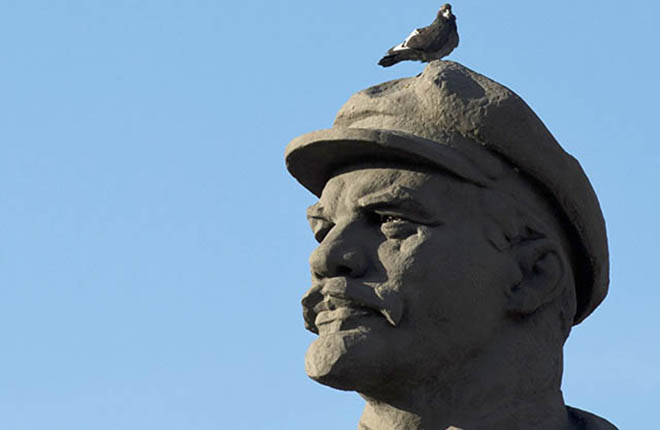From Lennon to Darth Vader, the so-called decommunization of Ukraine is generating monsters and triggering retaliatory mechanisms that are likely to leave innocent collateral victims on the ground.
David Randall wrote on Internazionale about iconoclastic temptation of those moralists who like to topple monuments. “It’s ok to pull down the statues of Lenin, but do we really need to get rid of all the embarrassing things of our past only to show how much we have progressed?”, he wrote. He referred to those in America who want to erase the name of Thomas Jefferson, third president of the United States, for having had an affair with a slave.
In Ukraine have no doubts. The decommunization wake of the country – initiated by a law signed by President Petro Poroshenko last April – hundreds, maybe thousands of streets, buildings, squares and monuments are passing under the guillotine of a place-name Peronism, sometimes a bit pharisaic and dull. Now, I understand the example quoted by Randall, but are we really sure it’s always fine to topple the statues of Lenin?
Lennon Street
Some doubt arises when you see the results. Like in Kalyny, a village in Transcarpathia, where Lenin Street has become Lennon Street, John Lennon. The governor of the region, Hennadiy Moskal, apparently Beatles fan, ordered it. Or like in Odessa, where a statue of the father of the October Revolution was replaced by Darth Vader, the obscure character of the Star Wars saga.
In both cases, the change has been possible thanks to the law – actually a package of laws – on decommunization of Ukraine. A series of measures – that, among other things, have banned the Communist Party and compared communism to Nazism – much criticized by international organizations for human rights. The OSCE has expressed doubt that the law can limit freedom of expression, especially the ban on communist symbols, while the Venice Commission said that the law does not comply with European legislative standards. And the Polish government harshly disapproved the glorification of OUN partisans, the insurgent army that was responsible for the deaths of tens of thousands of Poles during the World War II.
Slate clean
The paradox is that local subjects have a mandatory deadline to comply with the law. The municipal councils had to rename all the streets, squares and monuments related to communism by November 2015. Where this has not happened, it took the provinces to provide by May 2016. If, after that date, a Lenin streets or October square still survives, the cabinet of ministers will erase them forever. In short, there is no possibility to leave things as they are. Even if the inhabitants of a city do not care to have a street named after a Liverpool born singer and instead prefer to remember the little pioneers or the Communist Youth. And cases like this do exist.
A slate clean on the past that so far has changed the names of 170 cities, thousands of streets and squares, dozens of parks, neighborhoods, regions and metro stations.
Pigeons
Iconoclasm is always bad. It is a manifestation of stubborn and pernicious obscurantism. Because, when they start, the Taliban of place-names will not stop, triggering an escalation with unpredictable results.
Kiev administration is now deciding to rename Moscow Avenue after Stepan Bandera, the criminal hero (it’s an oxymoron) that divides the country and historians. And Russians get mad.
On the other side – no one knows if in response, but certainly without much hesitation – Russians paved over the house in Orenburg where lived the poet and Ukrainian national icon Taras Shevchenko, to build a parking lot . And Ukrainians get mad.
So, really we should leave monuments alone. Because, paraphrasing a famous quote, after all, statues are only good for pigeons to sit on. Who said it? Vladimir Ilich Ulyanov, also known as Lenin.
@daniloeliatweet
David Randall wrote on Internazionale about iconoclastic temptation of those moralists who like to topple monuments. “It’s ok to pull down the statues of Lenin, but do we really need to get rid of all the embarrassing things of our past only to show how much we have progressed?”, he wrote. He referred to those in America who want to erase the name of Thomas Jefferson, third president of the United States, for having had an affair with a slave.
In Ukraine have no doubts. The decommunization wake of the country – initiated by a law signed by President Petro Poroshenko last April – hundreds, maybe thousands of streets, buildings, squares and monuments are passing under the guillotine of a place-name Peronism, sometimes a bit pharisaic and dull. Now, I understand the example quoted by Randall, but are we really sure it’s always fine to topple the statues of Lenin?
Some doubt arises when you see the results. Like in Kalyny, a village in Transcarpathia, where Lenin Street has become Lennon Street, John Lennon. The governor of the region, Hennadiy Moskal, apparently Beatles fan, ordered it. Or like in Odessa, where a statue of the father of the October Revolution was replaced by Darth Vader, the obscure character of the Star Wars saga.
In both cases, the change has been possible thanks to the law – actually a package of laws – on decommunization of Ukraine. A series of measures – that, among other things, have banned the Communist Party and compared communism to Nazism – much criticized by international organizations for human rights. The OSCE has expressed doubt that the law can limit freedom of expression, especially the ban on communist symbols, while the Venice Commission said that the law does not comply with European legislative standards. And the Polish government harshly disapproved the glorification of OUN partisans, the insurgent army that was responsible for the deaths of tens of thousands of Poles during the World War II.




